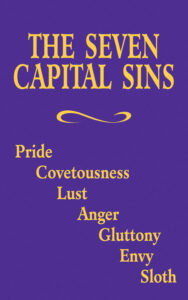Pride was the first sin committed. It was the sin of Lucifer. It was also the root of the Original Sin committed by Adam and Eve. Pride is the greatest of sins because it is the summit of self-love and is directly opposed to submission to God. It is, therefore, the sin most hated by God, and the one He punishes most severely. The punishment of the Angels, of Adam and Eve, of Nabuchodonosor, related in the Book of Daniel (4:27-30), bear witness to this. Pride is likewise the greatest sin because it is the fountainhead of the self-love in which all other sins take root: “From pride all perdition took its beginning.” (Tob. 4:14). There is a species of pride in every sin, whatever may be the individual nature of the sin itself. Pride is the most dangerous of sins, because it blinds our understanding, and unless something finally makes us realize the truth, we are liable to go on, day after day, in a spiritual self-delusion, imagining our acts to be good and virtuous when certain habits actually may be vicious. When we are blinded by pride, we do not consider our talents and abilities as God’s gifts to us, but attribute our good qualities to ourselves, with the right to use them as we see fit. Everybody is infected with the virus of pride! But there is a particular kind of pride in each individual; at least a particular kind dominates, though there may be several of its viruses in the same character.
This pride determines our temperament or our type of character, or at least is intimately related to it. Searching into our type of pride is very important for obtaining a true knowledge of ourselves, and for making fruitful efforts to root out sin and vice from our life.
If we are of a sanguine temperament, our pride takes the form of self-centeredness. We want to be the “hub of the wheel”; we want others to notice us. We are touchy and easily offended. Our pride goads us to seek fame, praise, admiration. We fall into vainglory.
If we have a choleric temperament, our pride is manifested in a strong self-will. We find it hard to submit to others or to yield to their opinions. We are often overbearing, critical, given to arguing, inflated with a sense of superiority, inconsiderate of the rights of others. If we are melancholic, our pride conceals itself under the garb of self-pity and oversensitiveness. Resentment, harboring grudges, suspicion, and unexpressed hostility are included in it. Often this pride is not recognized for what it is because it conceals itself as such, so we do not confess it as pride.
If we have a phlegmatic character, our pride inclines us to self-complacency and vanity. We are likely to be shocked by faults in others, but quite satisfied with our own selves. Pride of superiority makes us want to control the lives of others, to impose ourselves on them, to “domineer” over them. It makes our will rigid and unbending when others assert authority. It is a self-will and obstinacy that sets us against the will of God, opposes our neighbor and makes us inflexible in carrying out the dictates of our own self-love. Anger, indignation, arrogance, the spirit of contradiction and haughtiness are some of its offspring. This pride is usually rooted in a strongly opinionated mind which makes us refuse to see the light of reason or the truth evidenced by principles of revealed Faith. This unwillingness actually fosters ignorance. It is the pride which keeps many from entering the Church, or returning to the practice of the Faith when they have fallen away.
This article is taken from a chapter in The Seven Capital Sins by the Benedictine Convent of Clyde, Missouri, which is available from TAN Books.



